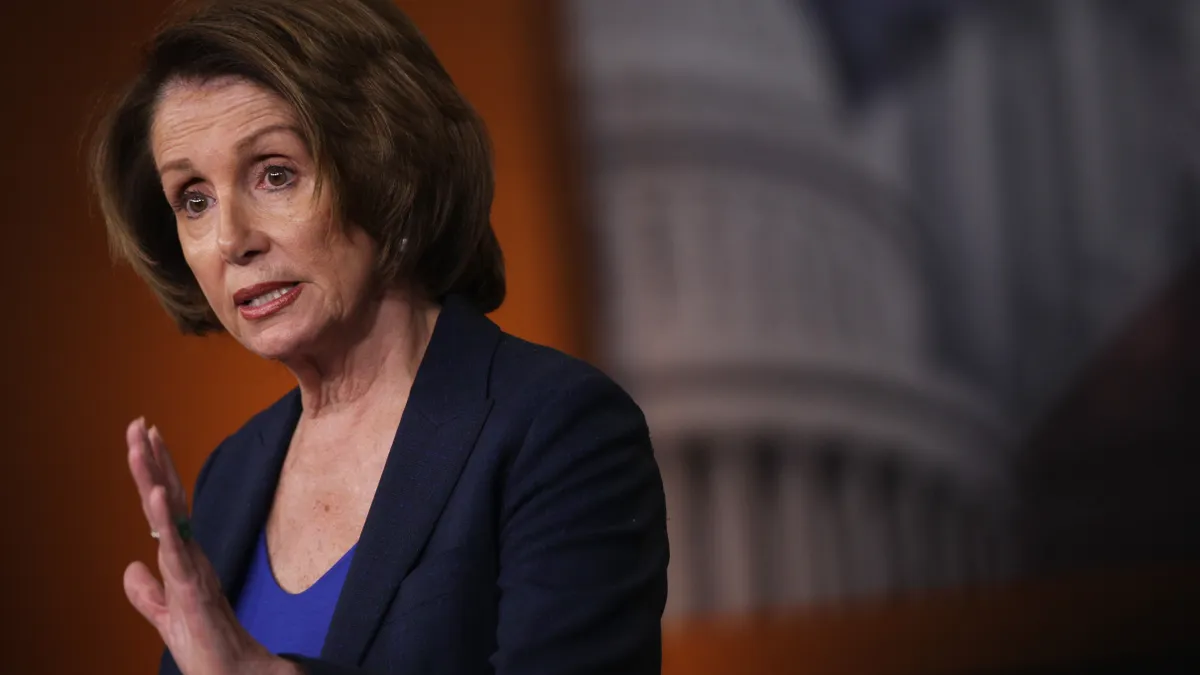Dive Brief:
- With a fourth stimulus package in the works, the renewable energy industry is raring for short- and long-term aid as it faces supply chain disruptions and critical project delays that could cost the sector billions of dollars.
- Stakeholders were hopeful broader energy concerns would be rolled into an infrastructure package House Democrats had floated last week. "Certainly clean energy is part of infrastructure," Solar Energy Industries Association (SEIA) Vice President of Congressional Affair Erin Duncan told members during a Friday webinar.
- But House Speaker Nancy Pelosi on Friday stepped away from her initial push to include green infrastructure in a round four stimulus bill. Clean energy advocates still say there are avenues for power sector relief from the federal government, however.
Dive Insight:
Pelosi had initially indicated that infrastructure and job creation would be the ultimate focus of the next federal legislative package, as she and other leading Democrats brought forward last week a revised version of their sweeping $760 billion January infrastructure proposal.
The legislation was a sweeping grid modernization plan to make the power grid more resilient and ready for higher levels of renewable energy and included provisions around distributed energy resources, energy efficiency and cybersecurity.
"We still continue on emergency and mitigation, but in the next bill, our focus will also be on recovery," Pelosi said Wednesday. "So that's why, as I said, we put forward our plan to invest in our infrastructure … The need for job-creating action again is even more critical."
But on Friday, she shifted her tone, saying instead the package should focus again on relief, and take a similar approach to the most recent Coronavirus Aid, Relief, and Economic Security (CARES) Act that President Donald Trump signed into law March 27.
"The acceleration of the coronavirus demands that we double down on the down payment we made in CARES by passing a CARES 2 package," Pelosi said in a statement. "It is imperative that we go bigger and further assisting small business, to go longer in unemployment benefits and provide additional resources to process [unemployment insurance] claims and to give families additional direct payments."
This means any larger boost to the renewables industry will remain on hold for now, but as the sector struggles to meet deadlines and maintain a workforce, clean energy leaders say Pelosi's move is justified.
"Given today's employment reports, Congress is appropriately laser-focused on protecting jobs and finding ways to backfill holes in the economy being created by COVID-19," American Council on Renewable Energy Chief Operating Officer Bill Parsons told Utility Dive in an email. "Like many industries, the renewable sector is being hit really hard by supply chain disruptions, shelter-in-place orders and other pandemic-related delays that threaten the jobs of hundreds of thousands of workers, as well as the time-sensitive tax incentives on which renewable projects depend."
Tax credit qualifications are a more immediate concern for the renewables industry. The sector relies on certain deadlines in order to qualify for financing, and wants to see extensions for those deadlines as billions of dollars across the wind and solar sector are at risk due to COVID-19 related delays.
"It's pretty clear that there's tons of pain out there," SEIA CEO Abigail Ross Hopper said during the webinar.
For example, projects that began construction in time to meet the commence construction deadline for the production tax credit or the investment tax credit, but that might not be able to meet placed-in-service deadlines because of supply chain or other COVID-19-related disruptions, should be able to get an extension, industry leaders say. Though a lot of solar companies kept necessary equipment stockpiled in order to meet such critical deadlines, SEIA is "starting to see some of those inventories decline without new product coming in," John Smirnow, general counsel and vice president of market strategy at SEIA said Friday.
"Our companies are in dire need of emergency relief for their placed-in-service and commence construction deadlines, as well temporary refundability to ensure they can monetize project credits over that time," said Parsons. Such extensions would come at a minimal cost to the federal government, as spending on those credits is already assumed in the budget.
Federal lawmakers are in recess until April 20, though with social distancing protocols ramping up in the Capitol and across the U.S., it's unclear whether Congress will be in any hurry to reconvene promptly, Politico reported.














